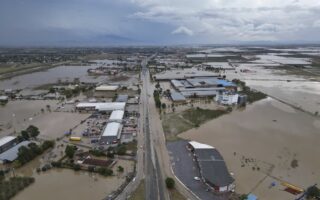2023 a year of negative weather records for Greece

Greece smashed a total of nine climate records in 2023, according to a recent report by Climatebook.gr, a website dedicated to the subject, with expert contributors.
Presenting the data compiled by the platform, meteorologist and head of research at the National Observatory of Athens Kostas Lagouvardos and NOA researcher Stavros Dafis noted that 2023 was the hottest and driest year Greece had seen in three decades, it had the highest sea temperatures since 1991, and the greatest expanse of land destroyed by fire, but also the fewest whirlwinds in 20 years. December 2023, meanwhile, was the hottest since 1991, with a deviation of 4-5 degrees Celsius from previous years, September was the wettest since 1991 as a result of the massive storm in central Greece, but February was one of the driest ever reported in Greece, withs some areas seeing no rain at all throughout the month. Last but not least, Athens experienced 300 successive hours with temperature over 30 degrees Celsius, while the Cerberus heatwave last July was the longest ever recorded in the country.
What the figures tell us, in short, is that 2023 was the hottest year Greece has seen in the past 30 in terms of both average highs and lows, with the average yearly temperature clocking in at 15.2C, said Lagouvardos. The second hottest year since 1991 was in 2020, he added.
‘We have never seen a heatwave with such a long duration, just as we have never seen the Athens basin experiencing 300 continuous hours of temperatures in excess of 30 Celsius’
According to the expert, heatwaves do not affect all areas in the same way, as some parts of the country heat up faster than others. He says the worst-hit areas tend to be in northern Greece and far from the sea.
“The fact that inland areas show a much faster rise in temperature is an important factor because it affects big crops and, by extension, many other areas of the economy,” noted Lagouvardos.
One of the weather events that contributed to 2023 being such a hot year was Cerberus. “We have never seen a heatwave with such a long duration, just as we have never seen the Athens basin experiencing 300 continuous hours of temperatures in excess of 30 Celsius,” added Dafis.
Record heat and low rainfall had a knock-on effect on Greece’s forests and shrubland, making the wildfires of 2023 among the most destructive the country has had. According to the data, 174,000 hectares was destroyed by fire last year, far above the yearly average of roughly 50,000 hectares from 2006. “The Evros fire last August scorched more than 90,000 hectares, making it the biggest wildfire in European territory since 2000,” noted Dafis.
The high surface temperatures of Greece’s seas are also causing concern, as the highest temperatures were 1.2 to 1.4 Celsius above the highs recorded between 1991 and 2020. In fact, warmer seas, in combination with other factors, caused the big storm, dubbed Daniel, that hit central Greece, and Thessaly in particular.
“Climate change played a huge role in September’s floods,” said Dafis. “All sorts of studies are already being carried out that prove as much, as do all the data which show that the high temperatures in the summer of 2023 were, to a significant degree, responsible for the huge volume of rainfall.”
According to Lagouvardos, Storm Daniel dumped 5 billion cubic meters of rain on Thessaly in September 2023, equal to the amount of water consumed in Attica as a whole over a period of 14 years.





